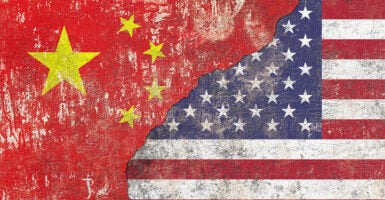The Biden administration recently removed restrictions on 27 Chinese companies that prevented those companies from purchasing American technology that could potentially be turned against the U.S. A detailed examination by The Heritage Foundation’s Oversight Project reveals connections between several of these companies and the Chinese Communist Party’s surveillance and military programs.
The U.S. Bureau of Industry and Security removed these companies from what is known as the Unverified List. The list was designed to prevent the potential misuse of U.S. technology and products by restricting certain foreign entities from purchasing items that could serve a dual use—in other words, that could have both civilian and military uses.
Export restrictions are applied to civilian technology that could be adapted for “military, terrorism or potential WMD [weapons of mass destruction]-related applications.”
Following Russia’s invasion of Ukraine, the Bureau of Industry and Security became more active in applying restrictions on Russian companies to prevent Russia from procuring dual-use equipment. However, this was generally seen as too little too late, as Russian President Vladimir Putin had already procured significant amounts of dual-use equipment prior to the invasion.
With China, the Biden administration has been less than transparent with its justification for relaxing the restrictions. The administration said it removed the 27 companies from the Unverified List by establishing their “bona fides” through end-use checks of how they were using the equipment they purchased. However, no specific mechanism for conducting these checks or for how the administration would verify them has been made public.
Concerning Connections Unearthed
Heritage’s Oversight Project took a further look into these companies. Several have raised potential security concerns because of direct connections to the Chinese Communist Party and China’s defense industry while also showing a proclivity toward procuring technologies that have both civilian and military uses. (The Daily Signal is Heritage’s news and commentary outlet.)
Here, the Oversight Project highlights three companies that are particularly concerning:
Beijing Zhonghehangxun Technology (also known as Beijing Vistek Co. Ltd), a startup connected to the Chinese Academy of Sciences’ Center for Research on Intelligent Perception and Computing, is known for its work on large-scale crowd surveillance systems.
The Hoover Institution further highlighted Vistek’s role in surveillance equipment used in the Xinjiang region against the Uyghur population as well as the company’s cooperative partnership with Hikvision. Hikvision is a known supplier of surveillance technology to the CCP in applications that are “widely used in state security affairs,” according to Hoover’s 2021 Eyes Wide Open report.
Sen. Marsha Blackburn previously called for the company to be added to the Unverified List following the release of the report.
Further, Nanjing Gova Technology Co. Ltd, identified as a Chinese defense contractor in its recent press releases, plays a role in China’s aerospace industry. That includes building pressure sensors and sensor networks for new-generation fighter aircraft, rockets, and weaponry since as early as 2011.
Shuang Xiang (Fujian) Electronics Company Limited, specializing in optoelectronics, has connections to other CCP surveillance technology vendors. In recent filings, it has shown a strategic emphasis on investments in technologies that have both military and civilian applications.
Shuang Xiang has been involved in the manufacture of optical lenses and related equipment that are used in surveillance networks and in the enforcement of social credit scores. Several of the company’s board members also have direct ties to core elements of the Chinese Communist Party.
In addition, Sino Super Conductor Technology, Hunan University, and Nanchang University are three other entities that were removed from the list that are of concern due to military-civil fusion programs and their overlap into classified defense research.
A Need for Clarity and Caution
The decision to lift Unverified List status on these companies coincided with Commerce Secretary Gina Raimondo’s visit to Beijing in August.
The connections the Oversight Project identified between these companies and the CCP’s broader military and surveillance ambitions necessitate greater transparency and justification as to why the Biden administration lifted the restrictions.
Such decisions have broader implications, not only for U.S. national security and foreign policy, but also for human rights within China, where the CCP utilizes surveillance technology to control its own population.
The Daily Signal has reached out to the Bureau of Industry and Security for comment but so far has received no response.
Have an opinion about this article? To sound off, please email [email protected], and we’ll consider publishing your edited remarks in our regular “We Hear You” feature. Remember to include the URL or headline of the article plus your name and town and/or state.

































One Reply to “Biden Admin Removes Restrictions on China Purchasing American Technology That Could Be Used Against US”